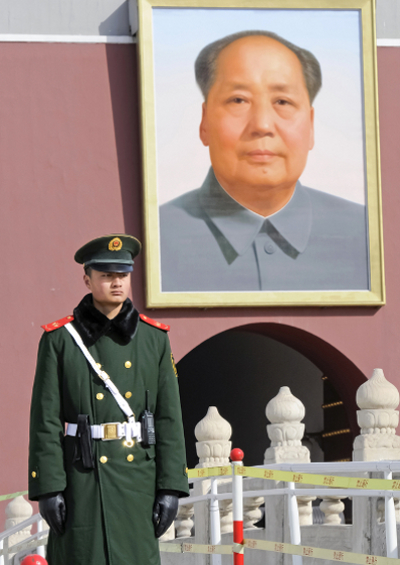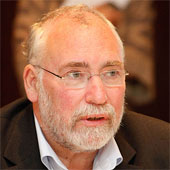China: Radical Transformations – From Middle Kingdom to Global Sea Power
China from Mencius to Mahan – through Marx, Mao and Market Leninism.
August 15, 2014

Confucius (551-479 BCE) never wrote anything. His teachings were transmitted orally. His most influential disciple was Mencius (c 372-289 BCE) who compiled his teachings in writing. Thus, what is called Confucianism is in great part derived from the writings of Mencius.
Mencius
Both Confucius and Mencius lived in periods of political and social disorder in China. Order was to be achieved through harmony. Harmony, in turn, required respect for a strict social hierarchical order.
The same hierarchical perspective that Mencius brought to society — for example, the tenets upheld in the “five basic relationships,” — also applied to the traditional Chinese view of the world. China (the Middle Kingdom) is the center of universal civilization, surrounded by concentric circles of “barbarians.” The further they are from China, the more barbarian.
The Chinese perspective was buttressed by the fact that their country historically had long been the world’s wealthiest nation. Just before the Opium Wars (1839-1842 and 1856-1860), China accounted for 33% of global GDP.
However, with the emergence of the “new world” and the agricultural, scientific and industrial revolutions in Europe, that reality was changing profoundly. It effectively rendered the traditional Chinese perspective of the world obsolete.
In the imperial court, however, “Mencius” thinking continued to prevail. China’s rigid conservatism prevented it from embarking on transformative reforms, as its century of humiliation (from the Opium Wars to the Liberation in 1949) and socio-economic collapse ensued.
Marx
By the turn of the 20th century China was in a mess, plagued by internal warfare, economic collapse and social upheaval, while humiliatingly pummeled by the West and Japan.
In the “new culture movement” that emerged among modern reformist Chinese intellectuals, Confucius was seen as the source of the collapse. The reformers were virulent in their anti-Confucianism.
In the search for a guiding ideology, the Chinese communist party (CCP) was founded in 1921. Down with Confucius, hail Marx!
The beginnings of the CCP were not auspicious for many reasons — not the least of which was internal theoretical dissension. Marx had envisaged that the communist revolution would take place in advanced industrialized capitalist societies (e.g., Germany) and would be led by the urban industrial proletariat.
In order to justify theoretically the revolution in Russia, Lenin had devised the concept of the “weak link in the chain of capitalism.” Whereas Russia might have been the weak link of capitalism, in China capitalism hardly existed in even embryonic form.
As a result, the Chinese urban industrial proletariat had insufficient critical mass to be a viable revolutionary force. In the “Shanghai massacre of 21 April 1927,” the military forces of the Chinese nationalist party led by Chiang Kai-shek virtually annihilated the CCP.
Mao
In the same year, Mao Zedong wrote what would become a seminal work with vast reaching implications. It was entitled: Report on an Investigation of the Peasant Movement in Hunan.
While China’s urban industrial proletariat was very small, it had masses and masses of disaffected peasants. Mao asserted these should become the vanguard of the Chinese communist revolution.
Though Mao never renounced Marxism, his thinking represented a clear case of theoretical heterodoxy, indeed heresy when viewed inside the edifice of Marxist thought. Little wonder that it took Mao almost a decade before he was finally able to impose his leadership on the CCP, which he retained until his death in 1976.
While, as noted, Confucius wrote nothing (nor did Deng Xiaoping), Mao was a prolific writer. The Selected Works amount to some ten volumes (four of which can be found on the shelves of my library).
Mao made two major theoretical contributions to the theory of revolutions: the first was how to mobilize the peasantry into a revolutionary force in poor pre-industrial countries.
His second contribution was in guerrilla warfare. Revolutionary independence leaders of decolonizing countries in Africa and Asia flocked to Beijing to seek Maoist instruction specifically on these two themes.
Mao undertook radical reforms with the twin aims of ridding China of feudalism and imperialism, the two yokes from which Chinese people were to be liberated.
Much of the war on feudalism consisted of attacks on Confucianism. For example, while Confucianism accorded females a subordinate lowly status, Mao described women as holding up half the sky. Wives were granted the right to divorce, which was not only unprecedented in China, but indeed in most countries, including in the West at that time.
It is true as well that Mao built up a personality cult and his policies were driven by ideology. The ideas contained in the Little Red Book were not only meant to be memorized and recited, but also implemented.
The results, most vividly illustrated in the Great Leap Forward and the Great Proletarian Cultural Revolution, were disastrous, devastating the country and costing tens of millions of lives.
Market-Leninism under Deng
By the time Mao died, the country was on the brink of collapse. After a relatively short succession battle, a new leadership emerged under Deng Xiaoping. Mao and Deng were in many respects direct opposites.
The contrast is above all noticeable in that, while Mao was a theorist, Deng was a pragmatist. There is no such thing, no body of knowledge known as “Dengism.” It is said that when Margaret Thatcher asked Deng what was meant by “socialism with Chinese characteristics,” he enigmatically replied “anything you want it to.”
While this anecdote is almost certainly apocryphal, it nevertheless encapsulates the pragmatism with which the reforms were undertaken.
In stark contrast to the catastrophic consequences of Maoism, the reforms undertaken by the new leadership brought about the greatest economic transformation in human history. Among other things, it brought the greatest reduction in poverty ever.
China’s ascension to global economic power in just three decades is breath-taking. This was achieved by implementing market-oriented reforms and promoting trade and investment, while maintaining strict political control over society and the economy. Hence the term “market-Leninism” – a road to growth that was also successfully emulated by Vietnam.
To fill the ethical social vacuum left by the end of Maoism, recent years have witnessed the quite startling revival of Confucianism – albeit a Confucianism à la carte to generate dynamic social harmony between tradition and modernity.
Notwithstanding occasional rhetorical lip-service, fundamentally both Marx and Mao are out. Market-Leninism, however, is seeking to restore Mencius. Perhaps that symbiosis provides a portrait of 21st century China – the answer to Maggie Thatcher’s question!
Mahan
As for the fifth “M,” we have to look back for a moment to the maritime exploits of Admiral Zheng He in the early 15th century. His advances were followed by a move to turn China inward and renounce sea power, indeed even sea presence, for the ensuing centuries.
But when the Chinese economy reached dizzying heights early this century, the question emerged whether China’s rise was that of another great power. The initial Chinese response was contained in an article by the Chinese thought-leader Zheng Bijian, published in 2005 and entitled China’s Peaceful Rise to Great Power Status.
In the ensuing nine years, the world and China have changed a lot. China is a global economic superpower with interests extending to literally all continents (including the Arctic).
China needs open access to markets, but even more so it needs open access to its vital sources of supply in food, raw materials and energy. It also sees a world in geopolitical mutation. The U.S. hegemon is both retreating and threatening, while ultra-nationalism is resurgent in Japan.
Compulsory reading among the CCP leadership is the seminal work of Alfred Thayer Mahan (1840-1914), the U.S. naval admiral and geo-strategist. His The Influence of Sea Power Upon History: 1660-1783 published in 1890, remains the most influential text on the geopolitical imperative of sea power.
While economic development was the major Chinese goal of the last three decades – and while economic development clearly remains paramount – it seems likely that naval development will be the major goal in the next three decades.
Especially as the Chinese, inspired by Mahan, recognize that China’s global economic superpower status can only be sustained by being a global naval superpower.
Takeaways
Read previous

The West: A Minority Club
August 13, 2014
